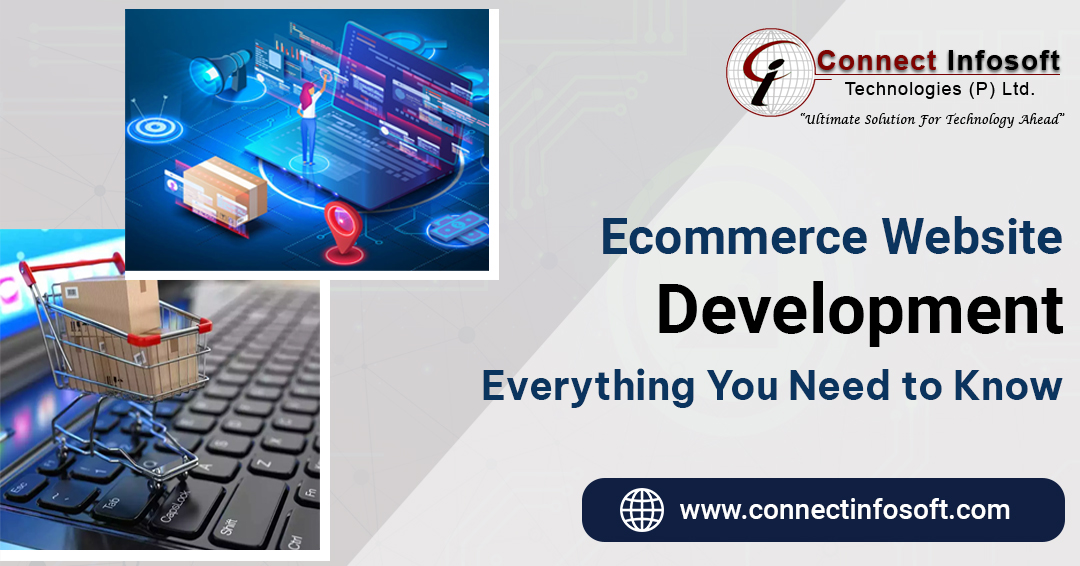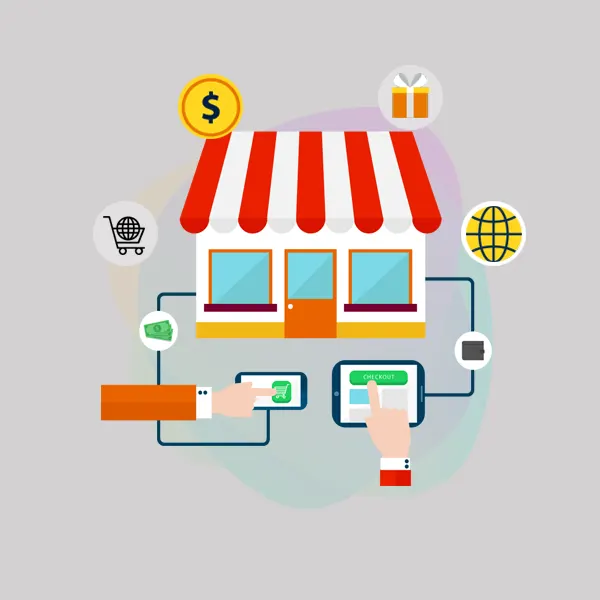Ecommerce Website Development Everything You Need to Know | Connect Infosoft

Ecommerce website development is the process of creating and building an online platform that allows businesses to sell products or services directly to customers over the internet. It involves various aspects such as design, functionality, security, and integration to provide a seamless shopping experience for users.
Here is everything you need to know about ecommerce website development:
Platform Selection:
Choosing the right ecommerce platform is crucial. Popular platforms include Magento, Shopify, WooCommerce, BigCommerce, and more. Consider factors such as scalability, customization options, security, ease of use, and integration capabilities when selecting a platform.
Responsive Design:
A mobile-friendly and responsive design is essential for ecommerce websites. It ensures that the site adapts to different screen sizes, providing a consistent user experience across devices.
User Experience (UX):
The user experience plays a vital role in the success of an ecommerce website. A well-designed and intuitive interface, easy navigation, clear product categorization, and streamlined checkout process are essential for a positive user experience.
Product Catalog Management:
Effective product catalog management is crucial. It involves organizing products into categories, managing product information, images, pricing, and inventory levels. It should be easy to update and maintain the product catalog as the business grows.
Secure Payment Integration:
Secure and seamless payment integration is critical for ecommerce websites. Integration with popular payment gateways ensures that customers can make payments securely and conveniently. Examples of payment gateways include PayPal, Stripe, Authorize.Net, and more.
Shopping Cart and Checkout Process:
The shopping cart and checkout process should be intuitive, user-friendly, and streamlined. It should allow customers to easily add products, view their cart, apply discounts, and complete the purchase smoothly.
Security:
Ecommerce websites handle sensitive customer information and payment details, so security is paramount. Implementing SSL certificates, encryption, secure payment gateways, and robust authentication measures helps protect customer data.
SEO and Digital Marketing:
Optimizing the ecommerce website for search engines (SEO) is essential to increase visibility and drive organic traffic. Implementing SEO best practices, integrating with social media platforms, and employing digital marketing strategies are key to attracting and retaining customers.
Analytics and Reporting:
Integration with analytics tools such as Google Analytics provides valuable insights into website performance, customer behavior, conversion rates, and other key metrics. Monitoring these analytics helps make data-driven decisions for improving the website and marketing strategies.
Ongoing Maintenance and Support:
Ecommerce websites require ongoing maintenance, updates, and technical support. Regularly monitor the website for performance, security vulnerabilities, and keep software and plugins up to date.
It's important to work with a professional ecommerce website development company or experienced developers who can understand your business requirements and build a custom ecommerce solution that meets your specific needs.
Options for Building an Ecommerce Website
When it comes to building an ecommerce website, you have several options available. Each option has its own advantages and considerations. Here are some of the main options for building an ecommerce website:
Custom Development:
Building a custom ecommerce website from scratch gives you complete control over the design, functionality, and features. This option allows for maximum flexibility and customization but requires significant time, technical expertise, and resources.
Ecommerce Platforms:
Utilizing established ecommerce platforms like Magento, Shopify, WooCommerce, BigCommerce, or PrestaShop provides a ready-made framework for building your online store. These platforms offer various templates, themes, plugins, and integrations, making it easier to set up and manage your store without extensive coding knowledge.
Content Management Systems (CMS):
Content management systems such as WordPress, Drupal, or Joomla can be used to build ecommerce websites using ecommerce plugins or extensions. This option allows you to leverage the CMS's robust content management capabilities while integrating ecommerce functionality.
Hosted Ecommerce Solutions:
Hosted ecommerce solutions like Shopify, Squarespace, or Wix offer all-in-one packages that include hosting, design templates, payment gateways, and more. These platforms simplify the website setup process, making it suitable for beginners or those with limited technical skills.
Open-Source Ecommerce Platforms:
Open-source platforms like Magento (Community Edition), OpenCart, or PrestaShop provide the source code that can be customized and tailored to your specific requirements. They offer more flexibility and control compared to hosted solutions but may require advanced technical skills or development resources.
How Do I Choose the Right Ecommerce Website Developer?
Next, we'll look at what an ecommerce developer does and why it's critical that their talents match your ecommerce web design requirements.
According to PWC study, while 73% of US customers believe customer experience is vital when purchasing online, only 49% believe brands give a positive experience.
Hiring an ecommerce web development company with experience designing and building for ecommerce is the greatest approach to ensure a better user experience on your site.
With luck (or if your platform, like BigCommerce, has a strong partner programme), you can locate ecommerce website creation services that are up to date on the current ecommerce best practises and can create a site that will satisfy your clients while increasing your conversion rate.
Understand different developers’ strengths
Some developers specialise at bringing your brand to life with a beautifully designed frontend, whereas others excel at backend customisation and technical implementation.
When evaluating developers for your online store, make sure you understand their key strengths.
While some developers are proficient of both backend development and frontend design, they usually specialise in one. Check that the developer you hire has the abilities you require.
Here are some of the most important factors to consider while designing an ecommerce website:
- Web security and PCI compliance.
- SEO stands for search engine optimisation.
- Payment methods and gateways are numerous.
- Integration of a CMS (content management system).
- Mobile-responsiveness.
- Product selection.
Functionality To Consider When Developing An Ecommerce Website
When developing an ecommerce website, it's important to consider various functionalities to ensure a smooth and effective online shopping experience for your customers. Here are some key functionalities to consider:
User Registration and Account Management:
Provide user registration and account management features that allow customers to create accounts, log in, and manage their profiles. This enables personalized experiences, order history tracking, and saved payment and shipping information for easier future purchases.
Product Catalog and Search:
Implement a well-organized and searchable product catalog with categories, filters, and sorting options. Include product details, images, pricing, availability, and customer reviews to help users make informed purchase decisions.
Shopping Cart and Wishlist:
Include a shopping cart feature that allows customers to add products, view and modify cart contents, and proceed to checkout. Additionally, consider implementing a wishlist feature that allows users to save products for future reference or purchase.
Secure Payment Processing:
Integrate secure payment gateways to facilitate smooth and secure online transactions. Support popular payment options, such as credit cards, debit cards, digital wallets, and other regional or international payment methods.
6 Steps For Developing a Custom Ecommerce Website
Developing a custom ecommerce website requires careful planning and execution. Here are six steps to guide you through the process:
Define Your Requirements and Objectives:
Start by clearly defining your business requirements, goals, and objectives for the ecommerce website. Identify the target audience, product/service offerings, desired features and functionalities, and any specific design or branding elements you want to incorporate.
Design and User Experience (UX):
Create wireframes and design mockups to visualize the website's structure, layout, and user interface. Focus on creating an intuitive and visually appealing design that aligns with your brand identity. Consider the user experience (UX) by ensuring easy navigation, clear product categorization, and a seamless checkout process.
Development and Coding:
Once the design is finalized, the development phase begins. Convert the design into functional code using appropriate programming languages, frameworks, and technologies. Implement the required features and functionalities, such as product catalog management, shopping cart, payment integration, and user account management. Optimize the code for performance and security.
Database and Backend Development:
Set up the database architecture to store and manage product information, user data, and other relevant data. Develop the backend functionality to handle tasks like inventory management, order processing, customer management, and integration with third-party services. Ensure scalability, security, and efficient data handling.
Testing and Quality Assurance:
Thoroughly test the website to identify and fix any bugs, errors, or usability issues. Perform functional testing to ensure all features work as intended. Test the website across different browsers, devices, and screen sizes to ensure responsiveness and compatibility. Conduct user acceptance testing to gather feedback and make necessary improvements.
Deployment and Maintenance:
Once testing is complete, deploy the ecommerce website to a live server or hosting platform. Set up necessary security measures, such as SSL certificates and backup systems, to protect customer data. Monitor the website's performance, security, and user experience regularly. Provide ongoing maintenance, updates, and support to ensure the website remains secure, up-to-date, and optimized for performance.
Throughout the process, it's essential to communicate effectively with your development team, involve stakeholders for feedback, and ensure adherence to timelines and budget. Consider partnering with experienced developers or an agency with expertise in custom ecommerce website development to ensure a successful outcome.


